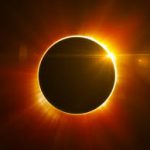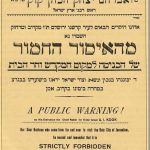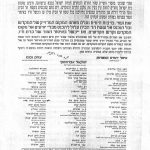On Monday, August 21, 2017, folks living in a large swath of the United States will get to witness the exceedingly rare phenomenon of a total solar eclipse. (Please do it safely!) And, wouldn’t you know it, there’s a Jewish angle. Roger Price, the author of the always fascinating blog Judaism and Science, reminds us that Jewish tradition prescribes no b’rakhah (blessing, benediction) for one to recite upon seeing an eclipse. Which is at least a bit strange. After all, there is a blessing for one to say when witnessing a comet or lightning, or for beholding impressive natural sites like oceans or mountain ranges. There’s a blessing to recite upon hearing thunder and even for experiencing an earthquake. So why not for an eclipse? Continue reading A Blessing for an Eclipse?
Monthly Archives: August 2017
The Mount and the Message
The recent flare-up of violence at the Temple Mount (הר הבית, Har Habayit) reminds us yet again of the deeply religious aspects of the conflict in the Middle East. These have mostly to do, of course, with the disagreements between Jews and Muslims surrounding control over a site holy to both groups. But the word “religious” brings to mind another set of conflicts, namely the tensions, fissures, and battles that Israel’s capture of the Mount in 1967 have set off within Judaism itself. Most notably, possession of the Temple Mount has served to strengthen (or, depending on your point of view, to exacerbate) the messianic tendencies present in Zionism – in both its secular and its “religious” (Orthodox) manifestations – tendencies that have wide-ranging, deep, and potentially explosive implications for the future of the Zionist project. Tomer Persico tells the story quite nicely, and his blog is definitely worth a look.
The Temple Mount has had some fateful ramifications for Jewish law as well. In particular, it has in recent years become the cause of a major change – which one observer (see below) calls a “quiet revolution” – in the way Orthodox poskim (halakhic authorities) understand the halakhah. This blog, of course, is quite interested in the subject of halakhic change. Whether this particular change qualifies as “progressive” is another matter. But it is change, which as always teaches us something about the nature of the halakhah we study and try to live. Continue reading The Mount and the Message


